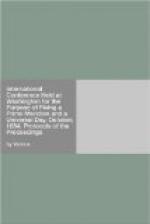The relation between the local time at any place and the universal time would then be expressed by the simple formula:
Local time = universal time + longitude.
Whereas, if the proposition of the Roman Conference were adopted, we should have to employ the less simple formula:
Local time = universal time + longitude — 12 hours.
In recommending the mean noon at Greenwich as the commencement of the universal day and of cosmopolitan dates, the Roman Conference refers to this instant as coinciding with the instant of midnight, or with the commencement of the civil day, under the meridian situated at 12 h. or 180 deg. from Greenwich. Now, this reference to the civil day and date on the meridian opposite to Greenwich appears not only to be unnecessary and to be wanting in simplicity, but it may also lead to ambiguity in the date, as expressed in universal days, unless this ambiguity be avoided by making an arbitrary assumption. No doubt the Greenwich mean noon of January 1 coincides with midnight on the meridian 12 h. from Greenwich, but with what midnight. What shall be its designation and the corresponding date given to the universal day? Shall we call the instant above defined the commencement of the universal day denoted by January 1 or by January 2? Each of these dates has equal claims to be chosen, and the choice between them must clearly be an arbitrary one, and may, therefore, lead to ambiguity.
By adopting Greenwich mean midnight as the commencement of the universal day, bearing the same designation as the corresponding Greenwich civil day, all ambiguity is avoided, and there is no need to refer to the opposite meridian at all.
Those are the ideas I wish to express with regard to the commencement of the universal day.
I may mention in connection with this subject that Professor Valentiner is one of the gentlemen who were invited, a week or two ago, to attend the meetings of this Conference, in order that, if requested, they might express their opinions from a scientific standpoint upon the questions before it; but as Professor Valentiner had to leave Washington before our sessions were at an end, I thought it would be expedient to ask him for his opinion in writing upon the matter which is now pending before this Conference. He has written a letter in German, expressing his opinion. I have caused that letter to be translated into English, and if the Conference allows me I will read it.
The PRESIDENT. If there be no objection to the proposition of the Delegate of Great Britain the letter will be read.
No objection being made, Professor ADAMS continued: It is well known that Professor Valentiner is an eminent practical astronomer, and I think that any opinion coming from him on this subject, which interests astronomers very much, will be considered of great weight. The letter runs as follows:
CHARLOTTESVILLE,
VA.,
October
12th, 1884.




